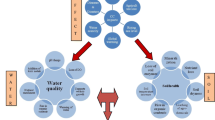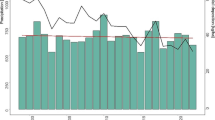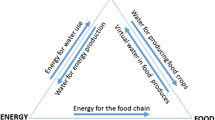Abstract
In this work, the efficiency of water markets in an irrigation district is put under consideration. This efficiency is referred to the private economic losses arising from a reduction in the availability of water, so the most efficient or optimal allocation will be the one that minimizes these losses or the one that provides the maximum private benefit. On this view, the optimal allocation has been studied in an irrigation community, and it has been compared with the rule of fixing a same quota and the proportional reduction. Besides, from the water allocation made by these last two rules, a water market has been simulated. Formulation for all of them is provided. Results show that water markets will improve the suboptimal allocation made by the rule of fixing a same quota and the proportional rule, even when transaction costs are high. They also show that, mostly, the greater the water restrictions, the greater are the gains from trade. It can be inferred too that, as long as all determinants have been taken into account and transaction costs are low enough, the aggregate losses of income ensuing from any prescribed water reduction will be the lowest both by means of the optimal allocation as with a market. Anyhow, results and conclusions clearly dependent on the relations made between allocations and crop yields.



Similar content being viewed by others
References
Adler JH (2009) Warming up to water markets. Regulation, winter 2008–2009: 14–17. CATO Institute
Alarcón J, Garrido A, Juana L (2014a) Optimal water allocation in shortage situations as applied to an irrigation community. J Irrig Drain Eng 140(3):04013015
Alarcón J, Garrido A, Juana L (2014b) Managing irrigation water shortage: a comparison between five allocation rules based on crop benefit functions. Water Resour Manag 28:2315–2329
Arriaza M, Gómez-Limón JA, Upton M (2002) Local water markets for irrigation in southern Spain: a multicriteria approach. Aust J Agric Resour Econ 46(1):21–43
Babel MS, Das Gupta A, Nayak DK (2005) A model for optimal allocation of water to competing demands. Water Resour Manag 19:693–712
Beare S, Heaney A, Mues C (2003) Water rights, transaction costs and policy reform. Abare Conference Paper 03.10
Benli B, Kodal S (2003) A non-linear model for farm optimization with adequate and limited water supplies: application to the South-East Anatolian Project (GAP) Region. Agric Water Manag 62:187–203
Blanco-Gutiérrez I, Varela-Ortega C, Flichman G (2011) Cost-effectiveness of groundwater conservation measures: a multi-level analysis with policy implications. Agric Water Manag 98:639–652
Coase RH (1960) The problem of social cost. J Law Econ 3:1–44
Colby BG, McGinnis MA, Ken AR (1989) Procedural aspects of state water law: transferring water rights in the western states. Arizona Law Rev 31(4):697–720
CRVRB (2013) Memorias anuales de la Comunidad de Regantes n° V de los Riegos de Bardenas: 2010, 2011, 2012 [In Spanish]. http://www.comunidadv.com/. Accessed 16 Aug 2013
Curie MM (1985) A distinct policy which forms a market within the California State Water Project. Water Resour Res 21(11):1717–1720
EEA (2012) Towards efficient use of water resources in Europe. European Environment Agency Report, No 1/2012
Fedra K (2015) River basin management: what do we really want? Environ Process 2(3):511–525
Franco A, Zhu X (2015) Water markets: insights from an applied general equilibrium model for extremadura, Spain. Water Resour Manag 29(12):4335–4356
Garrick D, Whitten SM, Coggan A (2013) Understanding the evolution and performance of water markets and allocation policy: a transaction costs analysis framework. Ecol Econ 88:195–205
Gobierno de Aragón (2012) Anuario estadístico agrario de Aragón [In Spanish], Departamento de Agricultura y Alimentación, Gobierno de Aragón, Zaragoza (Spain)
Goetz RU, Martínez Y, Rodrigo J (2005) Eficiencia de las reglas de asignación de agua en el regadío: asignación a través de mercados, de la regla proporcional y de la regla uniforme. Economía Agraria y Recursos Naturales 5(9):115–138 [In Spanish]
Grafton RQ, Horne J, Wheeler SA (2016) On the marketisation of water: evidence from the Murray-Darling Basin, Australia. Water Resour Manag 30(3):913–926
Griffin RC, Peck DE, Maestu J (2013) Myths, principles and issues in water trading. In: Maestu J (ed) Water trading and global water scarcity: international experiences. RFF Press, Abingdon, pp 1–14
Hearne RR, Easter KW (1995) Water allocation and water markets: an analysis of gains-from-trade in Chile, Technical Paper Number 315, The World Bank, Washington, D.C
IPCC (2007) Climate Change 2007: Impacts, adaptation and vulnerability. Contribution of Working Group II to the Fourth Assessment Report of the Intergovernmental Panel on Climate Change. Cambridge: Cambridge University Press
Lee TR, Jouravlev AS (1998) Prices, property and markets in water allocation. Economic Commission for Latin America and the Caribbean, United Nations, Serie Medio Ambiente y Desarrollo n° 6, Santiago, Chile
Lu HW, Huang GH, Lin YP, He L (2009) A two-step infinite α-cuts fuzzy linear programming method in determination of optimal allocation strategies in agricultural irrigation systems. Water Resour Manag 23(11):2249–2269
Maestu J (ed) (2013) Water trading and global water scarcity: international experiences. RFF Press, Abingdon
Martin P, Williams J, Stone C (2008) Transaction costs and water reform: the devils hiding in the details. Cooperative Research Centre for Irrigation Futures. Technical Report No. 08/08
McCann L, Easter WK (2004) A framework for estimating the transaction costs of alternative mechanisms for water exchange and allocation. Water Resour Res 40, W09S09
Molle F, Berkoff J (2006) Cities versus agriculture: revisiting intersectoral water transfers, potential gains and conflicts. Comprehensive assessment of water management in agriculture. Research Report 10, IWMI
Ortega JF, de Juan JA, Martín-Benito JM, López-Mata E (2004) MOPECO: an economic optimization model for irrigation water management. Irrig Sci 23(2):61–75
Poddar R, Qureshi ME, Shi T (2014) A comparison of water policies for sustainable irrigation management: the case of India and Australia. Water Resour Manag 28(4):1079–1094
Pujol J, Berbel J, Ramírez F, Viaggi D, Raggi M (2006) Evaluation of markets for irrigation water in the internal river basins of Catalonia, Spain. Span J Agric Res 4(1):3–16
Reca J, Roldán J, Alcaide M, López R, Camacho E (2001) Optimization model for water allocation in deficit irrigation systems, I. Description of the model. Agric Water Manag 48:103–116
Rico M, Gómez-Limón JA (2005) Los mercados de agua: análisis de los condicionantes para su correcto desarrollo en España. Estudios Agrosociales y Pesqueros 206:33–62
Sadegh M, Kerachian R (2011) Water resources allocation using solution concepts of Fuzzy Cooperative Games: Fuzzy Least Core and Fuzzy Weak Least Core. Water Resour Manag 25:2543–2573
Shangguan Z, Shao M, Horton R, Lei T, Qin L, Ma J (2002) A model for regional optimal allocation of irrigation water resources under deficit irrigation and its applications. Agric Water Manag 52:139–154
Srivastava P, Singh RH (2015) Optimization of cropping pattern in a canal command area using Fuzzy Programming Approach. Water Resour Manag 29(12):4481–4500
Wang S, Huang GH (2012) Identifying optimal water resources allocation strategies through an Interactive Multi-Stage Stochastic Fuzzy Programming Approach. Water Resour Manag 26:2015–2038
Author information
Authors and Affiliations
Corresponding author
Rights and permissions
About this article
Cite this article
Alarcón, J., Juana, L. The Water Markets as Effective Tools of Managing Water Shortages in an Irrigation District. Water Resour Manage 30, 2611–2625 (2016). https://doi.org/10.1007/s11269-016-1296-8
Received:
Accepted:
Published:
Issue Date:
DOI: https://doi.org/10.1007/s11269-016-1296-8




